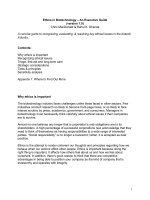Ethics in Biotechnology – An Executive Guide (version 1.0)
Bạn đang xem bản rút gọn của tài liệu. Xem và tải ngay bản đầy đủ của tài liệu tại đây (135.85 KB, 6 trang )
1
Ethics in Biotechnology – An Executive Guide
(version 1.0)
Chris MacDonald & Rahul K. Dhanda
A concise guide to recognizing, evaluating, & resolving key ethical issues in the biotech
industry.
Contents:
Why ethics is important
Recognizing ethical issues
Triage, first-aid and long-term care
Strategic considerations
Tests & principles
Sensitivity analysis
Appendix 1: Where to Find Out More
Why ethics is important
The biotechnology industry faces challenges unlike those faced in other sectors. Few
industries conduct research so likely to become front-page news, or so likely to face
intense scrutiny by press, academics, government, and consumers. Managers in
biotechnology must necessarily think carefully about ethical issues if their companies
are to survive.
Almost no one believes any longer that a corporation’s only obligations are to its
shareholders. A high percentage of successful corporations now acknowledge that they
need to think of themselves as having responsibilities to a wide range of interested
parties. “Social responsibility” is no longer a buzzword; rather, it is accepted as best
practice.
Ethics is the attempt to render coherent our thoughts and principles regarding how we
behave when our actions affect other people. Ethics is important because doing the
right thing is important. It affects how others feel about us and how we feel about
ourselves. In addition, there’s good reason to think that there are competitive
advantages in being able to position your company as the kind of company that is
trustworthy and operates with integrity.
2
Recognizing ethical issues
The first – and perhaps most difficult – element of ethical decision-making is recognizing
an issue as an ethical issue. It pays to think broadly and imaginatively, here.
Some biotech executives will want to assume that their company’s work is unlikely to
involve ethical issues or to attract public scrutiny. Such an attitude risks being both
naïve and dangerous because the people affected by corporate practices are the very
people who decide its propriety and its social / market context – from the regulatory and
financial agencies that oversee business practices to the consumers who decide which
competitor creates the most desirable products.
Signs of the potential for ethical problems can be spotted by asking yourself the
following questions:
• Is anyone to be harmed or helped by this decision?
• Is there a question of trust?
• Are there fiduciary obligations at stake? Other kinds of obligations?
• Is someone’s autonomy – their right to choose – at risk?
• Is there a question of fairness?
• How will the costs and benefits of this research and/or product be distributed?
• Are important relationships in jeopardy?
• Do my products meet a social need?
• Are there popular arguments in society (the press, social activists, etc.) that
relate to my core research?
Triage, first-aid and long-term care
Once an ethical issue has been recognized as such, you need to begin to think in terms
of time frame. Is the issue here a) an ethical crisis, b) an ongoing ethical debate, or c) a
distant possibility of ethical controversy?
a) Ethical crises require that companies act quickly. Experience shows that when
scandals or other crises arise, openness and honesty are key. The touchstone example
here is the Tylenol poisoning case, in which Johnson & Johnson quickly increased its
market share, arguably because their response was immediate, honest, and put public
safety first.
b) Ongoing ethical debate – such as the debate over stem cell research or somatic cell
nuclear transfer – requires that companies understand that the ethical context of their
research is sensitive in the here-and-now, despite the lag time before products are
developed. Stem cell technologies are roughly five to ten years away from product
release; however, ethical considerations are affecting corporate bottom lines today.
Debates over cloning and stem cells have created a wary investment community, while
government organizations like the National Institutes of Health (NIH) are unlikely to
provide funding to firms or research labs developing these technologies, especially if
those firms and labs do not have strong oversight guidelines. Because revenues are so
3
far down the line, sustainable funding sources are a critical component of this
revolutionary therapeutic tool. Those companies that have engaged in ethical reflection
as a long-term project, one that requires immediate and ongoing consideration rather
than post-marketing public relations, are better positioned vis-à-vis the investment
community and other sources of funding.
c) Issues perceived as involving the possibility of eventual ethical controversy require a
different kind of planning. If any lesson has been learned from the genetically modified
foods sector, it is that regulatory agencies are not the sole decision makers regarding
the marketability of new bioscience-related products. When regulatory policies lag
behind technological trends, it is likely that corporations will have to form their own,
responsible policies to oversee the introduction and continued evaluation of their
technologies; for instance, reflective information management procedures provide a firm
grounding for strategic planning and ethical deliberation (see Fig. 1). Further, as the
technologies grow, expand and revolutionize, corporations will need to continue to
involve themselves in that process, as well as to interact with the consumers and
intermediaries affected by and affecting the technology.
Fig. 1
Strategic / Marketing Considerations
Corporate behaviour is increasingly under the microscope. Nowhere is this more true –
and more likely to increase – than in the biosciences. These companies have as their
4
stock-in-trade the very building blocks of all life – DNA, RNA, proteins, stem cells, etc.
Many of their activities have implications for (or are seen as having implications for)
quite an expansive range of interested parties.
This may be cause for worry, but managers who succeed in getting their companies
“ahead of the curve” with regard to dealing with ethical issues may be able to market
that special capacity. This is not a question of public relations; rather, it is a comment on
the likelihood that markets – and investors – will reward those companies that show
themselves as being sustainable over long term periods because they are capable of
dealing with the complex ethical issues that are endemic to the field of biotech.
Tests & principles
From an ethical point of view, there is no one right way to evaluate your options. Some
advocate a principle-based approach, evaluating ethical issues in terms of social
benefit, avoidance of harm, respect for autonomy, and justice. Others favor a
“stakeholder” approach, advising companies to think imaginatively about the range of
groups and individuals who might have a “stake” – a legitimate ethical interest – in the
decisions they take.
While these issues are too important to leave to gut reactions, our instincts can be
important guides in identifying potential problems. Ask yourself the following questions:
• Would I be pleased to see this work reported – honestly and fairly – on the front
page of my local newspaper?
• Would I be worried if the relevant regulatory agencies knew about the decision
we’re making?
• Would I be happy to explain to my children the sort of work I do?
• Would I trust my products with my own health? My family’s health?
• Is the information that I keep confidential kept that way because of proprietary
considerations or because I am afraid of the repercussions if word of it was
released?
Sensitivity Analysis
Finally, we advise performing a sensitivity analysis on any proposed course of action.
Ask yourself: which variables in this situation would have to be different in order for my
decision to be different? Would we choose differently if this issue were a front-page
story? Would our view on this be any different if this decision were being made by a
competitor? If the competitor made these decisions instead of us, would we want those
actions to gain publicity so that they would be viewed as irresponsible? Would we do
this differently if we were an industry leader? Would we do this differently if we were
trailing the industry?
© Chris MacDonald & Rahul K. Dhanda, 2003
5
Contacting the Authors:
Chris MacDonald, Ph.D.
Department of Philosophy
Saint Mary's University
Halifax, NS
B3H 3C3
Canada
Tel. 902-420-5820
Fax. 902-420-5181
Rahul K. Dhanda
Business Development Associate
Director, Bioethics Program
Interleukin Genetics
135 Beaver St.
Waltham, MA 02452
USA
Tel. 781.398.0700 ext. 213
Fax. 781.398.0720
6
Appendix 1: Where to Find Out More
Websites:
Books:
Rahul K. Dhanda, Guiding Icarus: Merging Bioethics with Corporate Interests (Wiley,
2002).









